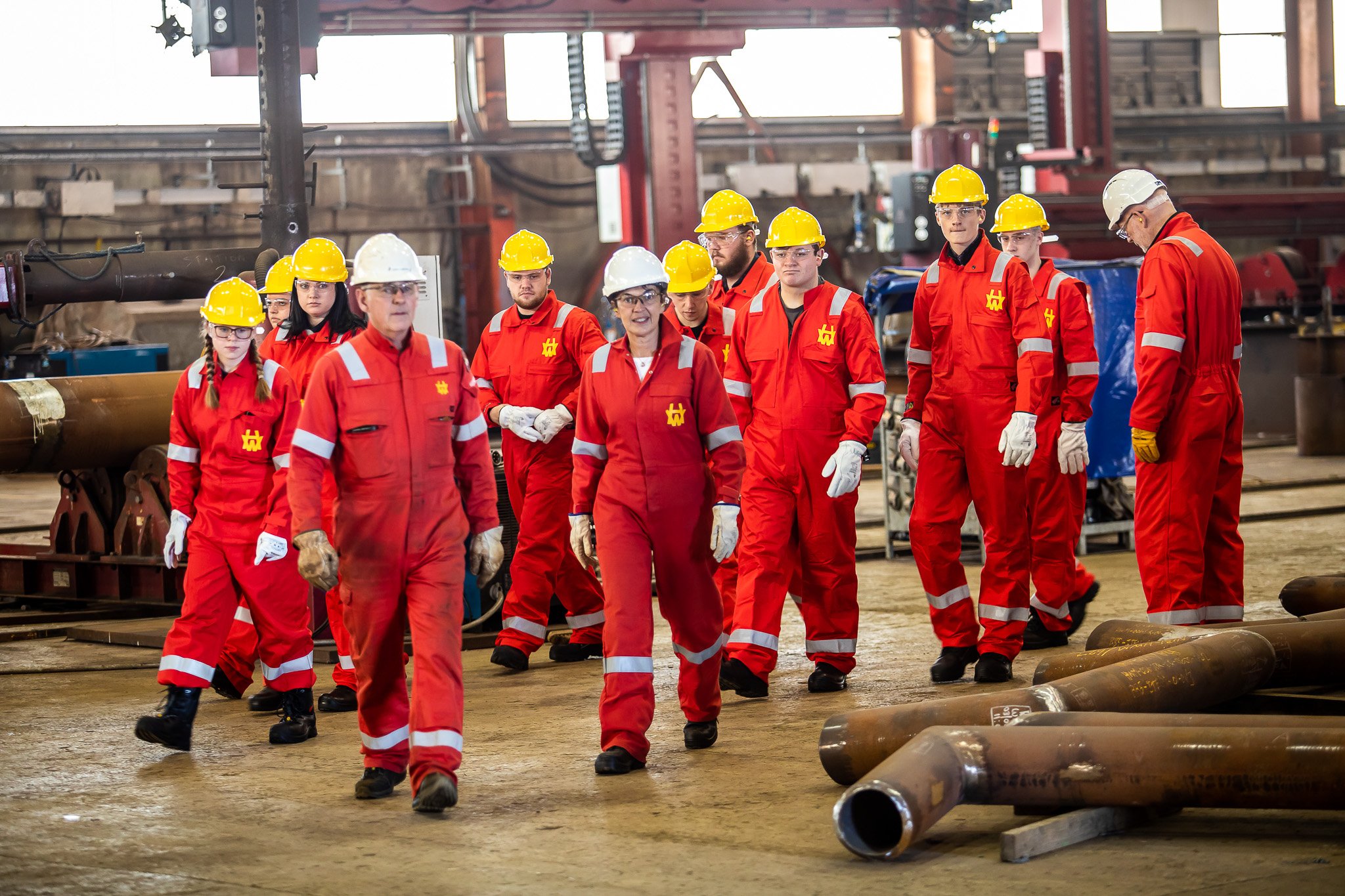How Apprenticeships can support the local economy
This week is Scottish Apprenticeship Week and all this week we are sharing stories and news to celebrate our apprentices, their achievements and looking at how apprenticeships create the skills every generation needs and every employer wants.
Scottish Apprenticeship Week is a nationwide celebration of Apprenticeships. It's a time when everyone can promote the benefits of work-based learning to people, employers and Scotland.
"For an island community to encourage candidates to remain on the island or indeed come back to the island is critical for the health of the local economy," - Albert Allan, General Manager at Harland and Wolff Arnish, Stornoway.
UHI North, West and Hebrides work closely with local employers to develop apprenticeships to support local people and businesses. This week we are delighted to highlight our partnerships with Harland and Wolff and the work of our Apprentices at the Arnish Yard in Stornoway.
Here, we speak to Albert Allan, Arnish’s General Manager, about why he think apprenticeships are so important for the local community and economy.
Tell us more about Harland and Wolff Arnish?
Harland and Wolff Arnish is part of the Harland and Wolff Group, which currently has four fabrication sites strategically located around the UK. The group focuses on 5 sectors, Energy (which includes Renewables, Oil and Gas, and Nuclear Sectors), Defence, Cruise and Ferry, and Commercial. The growing H&W Arnish Yard currently employs 150 employees locally, delivering new Build Barges and Subsea Manifolds. Recently it has completed projects for Oil and Gas, Renewables, Nuclear, and Mining contracts including exports to Greenland and the Black Sea. The yard is focussed on delivering quality projects safely, on time and within budget.
Tell us a little about yourself; your role as General Manager and your career?
As the General Manager for Arnish, I am responsible for the overall day-to-day running of the site. This includes the organisation and logistics for all incoming projects, site safety, and security as well as overseeing all monetary aspects. I started my career in the Nigg Construction Yard 35 years ago as Production Engineer with Brown & Root (KBR). With the Isle of Lewis site focused on the renewable, oil and gas, and general maritime sectors, I have 35 years of experience in project, operations, and construction management. I joined Harland & Wolff (Arnish) from KCA Deutag where I was Senior Vice President for the RDS Business Unit and member of the executive board.
Prior to KCA Deutag, I held roles at The Oman Oil Construction Company as General Manager, Mott MacDonald as Global Managing Director for its oil, gas, and petrochemicals business, Global Energy Group as Chief Operating Officer and spent 24 years at KBR where I worked on a wide range of oil and gas projects in the UK, Europe, Africa, the Middle East and the former Soviet Union. As Vice President of Operations, I have responsibility for KBR Operations in Baku, Moscow, Lagos, Cairo, Leatherhead, Greenford, Johannesburg, and established operations in Luanda, Atyrau and El Khober. Prior to this, I held positions as Regional Director of Project Controls, Construction and Project Management.
Why do you feel apprenticeships are so important?
There are a number of reasons that apprenticeships are important for the local communities we are located in and within the fabrication industry as a whole. For an island community to encourage candidates to remain on the island or indeed come back to the island is critical for the health of the local economy. Offering a well-paid apprenticeship, that ensures the individual is trained in a skill that could provide employment for life is a benefit to the individual and also to the local community.
For decades the fabrication sector has not invested in the next generation of workers, key skills have been lost to the sector without being replaced, and apprenticeships allow us to rebuild the workforce to ensure we make the most of the opportunities that the Energy Transition and the National Ship Building Strategy presents to the industry. We now have apprentices working on the shop floor learning from the experienced workforce, in welding, plating, electrical, and drawing office but also in equally important softer skills including Health and Safety.
Why do you like working with UHI North, West and Hebrides and how does the partnership benefit Arnish?
Working with the college allows the transition for the apprentices from school or other walks of life to ease into working in the fabrication industry. It equips the apprenticeship with the theory and some of the practical skills that will help them fit into the yard environment. It also allows the apprentices to achieve Further Education outcomes including SVQ’s to go alongside the practical skills they acquire.
Tell us more about how Arnish is developing and growing?
Arnish now is a significant employer within the local community, and we rely heavily on a local supply chain, we have further ambitions to grow, and as we do so will our positive impact on the local community and local economy. For 2024 we look to bring in greater numbers into our apprentice scheme and would encourage as many candidates as possible to apply.
Roddy Ferguson, Head of Engineering (Outer Hebrides) at UHI North, West and Hebrides, added:
As a key local employer of highly skilled engineering jobs, Harland and Wolff (Arnish) have made a substantial investment in the recruitment of apprentices since coming into the Arnish yard in 2021. This has given young people in the Outer Hebrides the opportunity to gain high-quality employment in a range of technical apprenticeship pathways and make a valuable contribution to production within their facility in Stornoway. UHI North, West and Hebrides are delighted to partner with Harland &Wolff in delivering training and education to their apprentices as part of the Modern Apprenticeship (MA) in Engineering and look forward to continuing this partnership as they aspire to grow their workforce and opportunities for young engineers in the years ahead.
